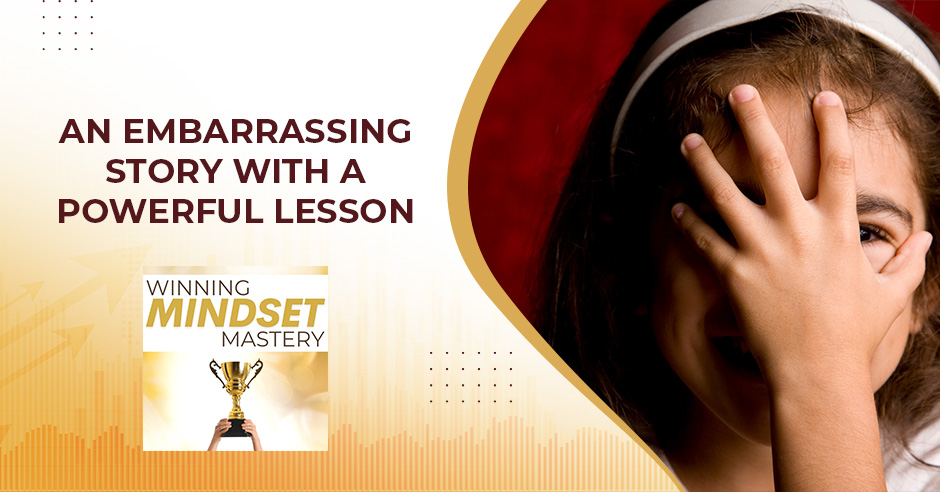
Some questions to consider: Are you a worrier? A catastrophizer? Are you always thinking about what could go wrong? Does your imagination constantly go into overdrive, picturing worst-case scenarios? If so, maybe you shrug your shoulders and say, “Well, that’s just the way I am.” Maybe you’re even thinking your worry is necessary and a good thing, that it helps you be alert and prepared. In reality, you are punishing your mind, body, and nervous system. And, ironically, you’re not really more prepared than you would be without the worry habit. In this episode, April talks about the extreme benefits of assuming the best instead of the worst. She also tells an embarrassing personal story with a powerful lesson for all of us. Sounds interesting? Tune in to episode 14 of the Winning Mindset Mastery Podcast to find out more.
—
Listen to the podcast here
An Embarrassing Story With A Powerful Lesson
I hope you are having a fantastic day and I hope this announcement makes one person’s day even better because I have the winner for our drawing that goes into the grand prize drawing for the VIP in-person day with me to develop that winning mindset that will serve you so well. Our winner is David Abel. David, congratulations. If you want to be like David, you still have a couple of days until the drawing on July 4th, 2023. Head on over to the website at WinningMindsetMasteryPodcast.com and there are instructions on how you can enter the contest for your chance to win.
In this episode, I want to talk about the extreme benefit of assuming the best instead of spending your time worrying or catastrophizing. If you are a worrier, you are one of those folks who is always thinking about what could go wrong in particular situations, who’s always almost obsessively thinking about the things that have caused you concern.
You may think there’s no way to be any different than that because that’s the way that you have always been. If you are a catastrophizer, you are one of those folks who think of what the worst-case scenario could be for anything that comes up that you are concerned about and then tend to try and make sure you can handle that.
I fell into this latter category of being a catastrophizer before I started working on my mindset. Partially because I grew up in such a chaotic and sometimes dangerous environment as a kid, and then even going into the military where you always want to be prepared for every scenario. It trained me to think in a way, “What’s the worst thing that can happen? Am I prepared to handle that?” Some people might say, “If you are worried about something, then you are on high alert, you are going to be able to handle it. If you are someone who makes sure you can handle worst-case scenarios, you are prepared.”
What I’d tell you is you are not more prepared than you would be if you assumed that it would work out because one, you are taxing your body, nervous system, and mind with being in this constant state of alert. Even if it doesn’t seem like a high alert, it does weigh on your body. Remember from previous episodes, we talked about how your mind and body cannot necessarily tell the difference between something that’s happening and something that you imagine is happening.

Assuming The Best: Your mind and body cannot necessarily tell the difference between something that’s happening and something that you imagine is happening.
If you want to test this out for yourself and you are somewhere where you can close your eyes, then close your eyes and start thinking about creepy crawly things that you can’t stand and start to imagine maybe it’s a snake. It is slithering up your pant leg. If it’s a creepy crawly thing, it is crawling across your face. If you have your eyes closed, you are imagining what that would feel like, what it would smell like, what you might see, and what you might hear. You can usually make yourself pretty freaked out pretty quickly and it’s because your body starts to react as if it’s happening.
Whether that gives you chills, makes your blood pressure go up and your heart pound, or makes your stomach turn nauseous, you can see right then and there how easily we can impact our body with our thoughts. We 100% do that when we are worrying or catastrophizing. What is the real benefit then of assuming the best? There’s a couple.

Assuming The Best: We can easily impact our bodies with our thoughts. We do that 100% when we are worrying or catastrophizing.
The first is if the worst thing happens or the thing you are worried about does come true, which 90% of the time it probably doesn’t. If it does, you are more well-rested and able to handle the thing that’s going to happen if you haven’t already been pinging out your system, your adrenals, and all of your disaster preparedness responses that you have in your body, whether it be a big thing or something that you are worried about at work, a crucial conversation, or something with your partner.
Two, if it does end up happening, you have experienced it twice. You experienced it when you were worried about it and you were waiting for it to happen and then you experienced it again when it did happen. For the mindset portion, remember that when we assume the best, we are looking for opportunities, solutions, and ways that we can have the best outcome possible. When we are focused on something that we are super afraid of, we can make it more likely to happen.
When we assume the best, we are looking for opportunities, solutions, and ways that we can have the best outcome possible. Share on XThat may sound silly but I’m going to use an example that will show you how you can do this in a small way. It will also be fun and embarrassing for me. Many years ago, when I was much younger and dating someone in the military, I was constantly worried that this person was going to break up with me. There are lots of reasons for that based on childhood stuff or being a young insecure girl.
I was so worried about it and was always catastrophizing about it that I made it happen. Here’s what I mean. The person that I was dating went on temporary duty in the military. They were supposed to be back on a certain day. I misunderstood the day that they were supposed to be back. When they got back, I didn’t hear from them.
This was before cell phones, texting, or anything like that. It would have been either a phone call or maybe an email. As the day went on, I got more worried and freaked out. I don’t even want to say how many times I called and emailed because it would be super embarrassing. I did it so many times. I lost count but I did it so many times and the messages got increasingly more like, “If you are going to break up with me, then go ahead and do it. We should go ahead and do this.”
I seemed like that crazy girl that every person has either heard about or experienced. When he got back and got all my messages, he reached out to me and said, “If me being a day later than you thought I was going to be caused you to react like this, I don’t think we have a good relationship and it’s best if we do break up.”
Let’s be honest. I made that happen because I freaked out and reacted in such a way that this person is like, “I don’t think this is a good idea.” Think about how many times we get worked up about something. We get in a headspace where we take actions that we would not take if we were in our winning mindset space. We would be in a much more powerful place if we assumed the best. The next time you find yourself worrying or catastrophizing, I want you to challenge yourself to assume the best so that you can get these three benefits.

Assuming The Best: We would be in a much more powerful place if we assumed the best.
1) Knowing that you are not making it more likely that negative things will happen based on the actions you are taking and the things that you are choosing. 2) Putting yourself in a mindset that allows you to see more solutions and more possibilities, and 3) Not wearing yourself out by giving yourself a physical reaction as if those bad things are happening already. I said three but there’s a bonus. If the bad thing you are worried about does happen, you only have to experience it once instead of experiencing it whether it happens or not. Give this a try and let me know how it works for you. I want to hear if this is making a difference. Here’s to your success.





